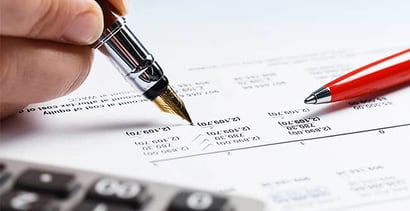

If you are a freelancer or are otherwise self-employed, chances are you are familiar with the quarterly or estimated tax rule.
Estimated taxes are the taxes the IRS requires you to pay on income that is not subject to withholding. If you were a W-2 worker, your employer would make these quarterly tax payments for you – along with their share.
But what if you don’t make these payments when they are due four times a year? Are you going to be thrown into debtor’s prison?
The good news for you is that is not going to happen.
However, what will happen is the IRS will charge you a penalty if you do not pay at least 90 percent of what you estimate you will owe them.
Even if you make your payments on time, if the amount is not at least 90 percent of your total yearly taxes, you will incur a penalty. That penalty is essentially interest on the taxes you owed but did not pay.
How do you avoid paying interest on your quarterly taxes?
1. Make payments on time.
The first way is the obvious one – pay your quarterly estimated taxes on time every April 15 , June 15, Sept. 15 and Jan 15.
By paying your estimated taxes on time, you can avoid the interest penalty they will otherwise assess. To ensure that you pay enough, remember tax needs to be paid on at least 90 percent of what you ultimately earn in the year.
“Do not underestimate or they
will penalize you anyway.”
2. Pay tax liability.
Another way to avoid the tax penalties is to pay 100 percent of the tax liability you incurred last year by April 15 of the current year.
This is a prepayment and gives the government access to your money for a longer portion of the year, but it will avoid you having to pay interest on your quarterly taxes.
3. Invest your taxes.
The third way to avoid paying interest on your quarterly taxes requires a little more active involvement on your part.
You also need to have an understanding of how the IRS calculates the rate of interest it charges you. The penalty rate they charge is based on the rates currently in effect for the 20-year treasury or T-bill.
If you think you can earn more by investing your taxes and then paying the penalty, this is one way to avoid or at least off-set the interest.
Since the current T-bill rates are near historic lows, this actually is not as difficult as it might seem.
No one likes to pay taxes, but it is necessary to avoid running afoul of Uncle Sam. To ensure you do not pay any more than your fair share, use these tips and suggestions I’ve given you.
Also, be sure to take every deduction that is available to you. As a freelancer and self-employed entrepreneur, you are entitled to credits and deductions that can make a big difference in your overall tax bill.
Talk to a tax professional if you have any questions about what is deductible and what is not.
Photo source: turbotax.com
Advertiser Disclosure
BadCredit.org is a free online resource that offers valuable content and comparison services to users. To keep this resource 100% free for users, we receive advertising compensation from the financial products listed on this page. Along with key review factors, this compensation may impact how and where products appear on the page (including, for example, the order in which they appear). BadCredit.org does not include listings for all financial products.
Our Editorial Review Policy
Our site is committed to publishing independent, accurate content guided by strict editorial guidelines. Before articles and reviews are published on our site, they undergo a thorough review process performed by a team of independent editors and subject-matter experts to ensure the content’s accuracy, timeliness, and impartiality. Our editorial team is separate and independent of our site’s advertisers, and the opinions they express on our site are their own. To read more about our team members and their editorial backgrounds, please visit our site’s About page.


